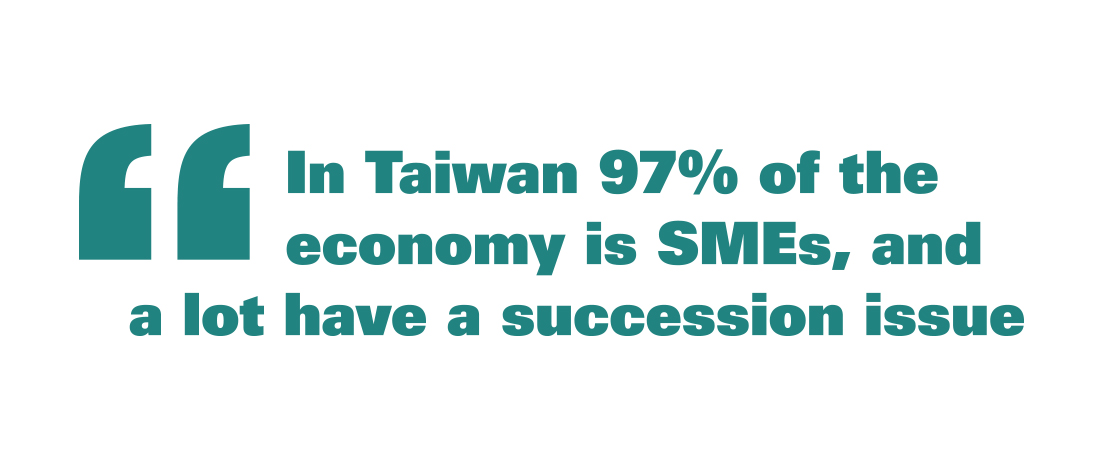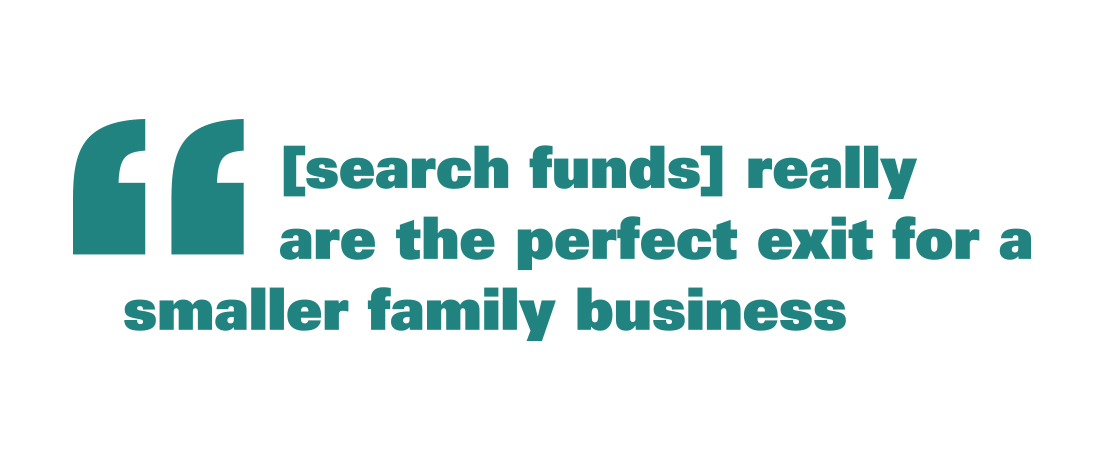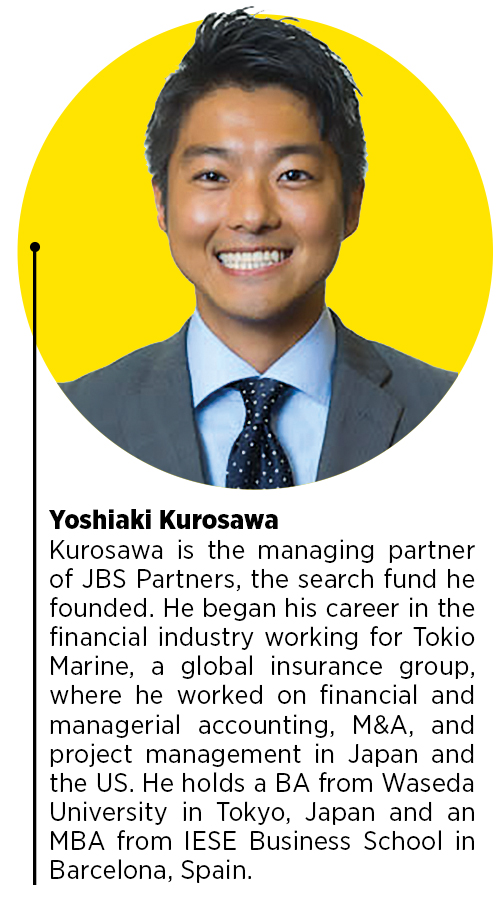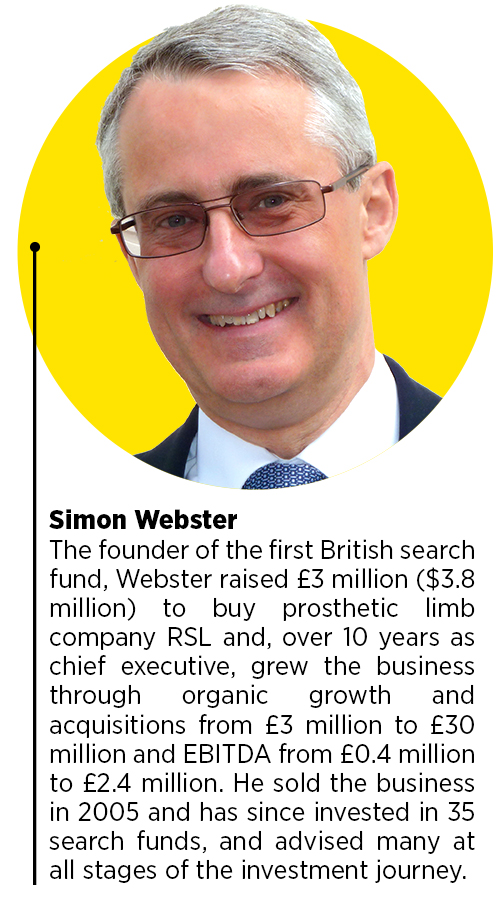Search engines: Making search funds work for family investors

Search funds have gained prominence in the US and are gathering steam in other parts of the world. Why have they caught the attention of family businesses and family offices? Jeremy Hazlehurst reports
Imagine you are a young, ambitious, entrepreneurially-minded MBA graduate. You want to run a business, but not a start-up. You do not want to wait decades to work your way up through the ranks of a business. A search fund could be the answer to your prayers.
The term originated in the US in 1984 to describe a vehicle run by a business-savvy person, usually a recently-graduated MBA, who acquires and runs a business. Backed by a small group of investors, the aim is to improve it, and sell it for a profit. As the number of MBAs increases, these one-person accelerators are becoming increasingly popular. And they are also starting to go global.

Over the past 35 years, 408 funds have been raised, 325 in the US, and 83 in the rest of the world. Some 13 of those were in the UK, 22 in continental Europe and 22 in Mexico. Those numbers might seem small, but interest is exploding. In 2012, just 10 funds were raised in the US, but in 2015 the number leaped to 43, according to Stanford Graduate School of Business research. Outside the US, 21 funds were raised in 2017, compared to just five in 2014, says a study by Spanish business school IESE. Young searchers are starting the process of raising the first funds in Israel, Taiwan, and Japan.

So how does it work? The search fund process has several stages. First a searcher has to find a group of investors, usually 8-10 strong, and convince them to invest. This usually takes two to six months. Secondly, the searcher looks for a company to acquire, which usually takes one to two years. Thirdly, they run and grow the business. On average, the business is held for four to seven years, but some searchers are keen to stay for longer, and if the business is growing well the investors might see the benefit of holding on. And finally, exit, where investors and the searcher realise liquidity.

Search funds appeal to investors because the returns are good. Between 1984 and 2017, $924 million of equity capital was invested into American search funds. This generated an aggregate equity value for investors of $5.7 billion, while entrepreneurs made around $1.5 billion. The aggregate pre-tax internal rate of return (IRR) by the end of 2017 was 33.7%, and aggregate pre-tax return on investment (ROI) was 6.9x, says Stanford. Outside the US, search funds have achieved an IRR of 33.3% and an ROI of 2.3x. The median fund returned 2.0x of initial search fund investors’ capital, and the top-performing fund returned 9.2x, says IESE.
Although they have existed for 35 years, search funds are still a niche pursuit. The numbers of MBAs who want to take on the risk of searching and running a business, rather than work for a corporate, will always be small. But as entrepreneurial skills become a more central part of more MBA courses, more graduates are deciding that the search fund route could be ideal to maximise their skills.
Riding the investment vehicle
Yun-Fan Chen is a new MBA graduate looking to raise a search fund in her native Taiwan.
“In Taiwan 97% of the economy is SMEs, and a lot have a succession issue,” she says.
“Last time I was back in Taiwan I saw a story on a magazine front-cover about it, so it is a big deal. Nobody talks about search funds, but I think it could be a very good model there. Also, Taiwan has a lot of people with MBAs from American schools who tend to go to China or Singapore because the salary level in Taiwan is lower. The search fund model could attract more MBAs to come back to Taiwan, and help the economy too.”
The story is similar for Yoshiaki Kurosawa, who is looking to start the first search fund in his native Japan. He says international investors are interested in a Japanese search fund, and he is now looking for a Japanese backer to give it local clout. He thinks that search funds could work well there.

“In Japan, there are a lot of major, small-sized companies and because it is an ageing society the average age of a chief executive is over 60-years-old,” he says.
“But there are not so many young people, so it is hard to find successors. There is potential in the healthcare or services industries, or something related to foreign workers because the government is keen to bring more in.”
Why then should families with businesses or family offices pay more attention to search funds? Firstly, search funds are a way for high net worth investors or family offices to invest in real businesses, perhaps in sectors that they understand and where they have know-how and contacts. Although they might sound risky, investors can get involved with US-based funds of search funds such as Relay Investments and Pacific Lake Investments, which provide knowledge and spread risk. In less transactional markets where personal relationships are highly valued, business-owning families are often perfectly-placed to find companies with search-fund potential. It is common for groups of investors to pool their skills, sitting on the boards of companies where they can add value, for instance.
The second reason search funds could appeal to families is as an exit solution.
“They really are the perfect exit for a smaller family business,” says Simon Webster, who began Europe’s first search fund in 1993 following an MBA at Columbia Business School and has since invested in 35 search funds.
“If you want somebody who is going to [buy, then] run the business sensitively, and not make too many radical changes straight away, it is the ideal option.”

While private equity firms tend to bring in an established chief executive, and feel no compunction about tearing things up and flipping the business as soon as possible, a search fund tends to take a slightly gentler approach.
“Typically, a family business owner cares about the future of the company,” says Marc Bartomeus, who raised Spain’s first search fund following an MBA at Massachusetts Institute of Technology. Bartomeus has run Repli, a manufacturer of industrial containers, since 2015.
“They would be very sad if they sell the company and they see a few years after that the company is not doing well,” he says.

“It is an economic transaction and they want to maximise the price they get for the sale of the company, but at the same time they want to know that the new owner will take care of the company as much as they did in the past.”
Also, search funds tend to fit better with smaller businesses which private equity houses, for instance, wouldn’t consider. Search fund acquisitions in 2016 and 2017 in the US had a median purchase price of $13.1 million and revenues of $10 million, slightly up from $12 million and $7 million the year before. The median purchase price/EBITDA multiple is around six. Outside the US, the median purchase price was slightly lower, at $9.3 million, revenues were $8 million and purchase price/EBITDA multiple was 4.9. Smaller family businesses are often right in the search fund sweet-spot.
Eyes on the prize
Apart from size, what else makes a potentially good search fund target? There are two sides to it. One is the business itself. Something with highly recurring income is good. Businesses from profitable closed search funds tended to have 50% or more recurring revenue. Also, a business should be growing faster than GDP—6% would be a healthy figure in developed economies. High EBITDA margins and stable cash flow history are also desirable, as are a large, diversified customer base, low capex, and a track record of weathering downturns. Something that is “quite hard to break,” says Webster. The new chief executive should be able to come in and kick the tyres for a year without the business suffering, before making changes.
Historically, about 30% of US companies acquired by search funds are in the services sector, including retail and business-to-business (B2B). Between 2010 and 2017, technology and software accounted for about 25%. Unsurprisingly, that number has increased compared to the 1985-2010 period. Healthcare and other types of technology businesses have accounted for about 10% of acquisitions since 1985.

The most popular sector for search fund acquisitions outside the US has historically been the services sector, followed by healthcare and internet/IT. In 2016 and 2017, the most popular sectors for acquisitions were manufacturing and transportation.
A second element that makes a good search fund target is the owners. Ideally, they should be looking to sell, perhaps because they are nearing retirement age, or in the case of a family business, have no successor lined up.
In pursuit of returns
How do the new entrepreneurial owners improve things? Generally, they will not make radical changes, but would be happy to increase revenues by 5% a year, perhaps through a slicker sales operation or more sophisticated financing. Returns will come from a mixture of growth and leverage, and the proportion will depend on the region. For example, in Europe leverage might play a larger role in growth than in South America, where bank debt is harder to get so growth will play a larger role in the mix.
What makes a good searcher?
“To me, it is very difficult to identify who would be a great entrepreneur,” says Bartomeus.
“It is the same as a job interview. It is very difficult to identify who is the best candidate until you have worked with him.”
However, he says that one great thing about a search fund, from an investor’s point of view, is that investors can part with a relatively small amount of assets—enough to cover salary and expenses—while the searcher searches.

“You can see how committed they are to the project, you can observe how they are dealing with business owners, how they are searching for companies, or selecting the companies that they want to buy,” says Bartomeus.
When the time comes to invest significant cash, investors have scoped out the searcher. Webster says they should be open and willing to listen, and have achieved something in their pre-MBA career by staying in one organisation and progressing. Humility also matters.
These freshly-minted MBAs are in the early stages of their search-fund journey. As baby boomers age and succession issues loom ever-larger for family-owned businesses, this new generation could soon find themselves spoiled for choice.










